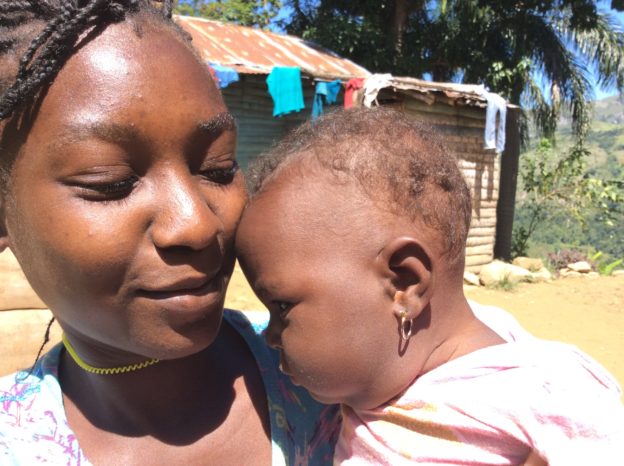Miramène is just 21 years old. She, her mother, and a sister-in-law live with their children in a small hillside house made of palm wood, in Gwo Labou, a mountain community in Kolonbye. The sister-in-law is also a CLM member.
She says that there are families that have the means to live, but hers never has. “Gen mount ki genyen. Nou men, nou pat janm genyen.” Her mother had six children, and supported them by farming. But with access to only very little of her own farmland, she had to struggle by renting plots or working them as a sharecropper. But hunger, Miramène says, wasn’t a serious problem when she was growing up. “The land used to yield more.” The family was even able to buy livestock. Her mother still raises some animals, even though things have gotten harder.
Miramène has one child, a girl who was born in January, just after the girl’s father left to look for work across the nearby border, in the Dominican Republic. He returned for a visit in April, and Miramène says that he was glad to meet their child.
As a girl, she had the chance to go to school. She made it to the second grade, but she explains that she got sick, anemic, and so had to give it up.
CLM took her into the program, she says, because she lacks. “M pa genyen.” That means that she doesn’t have. It’s not that she lacks this or that particular thing, but that she just doesn’t have possessions. Though she can occasionally earn a little bit of money when her mother gives her something out of the garden that she can carry to market and sell, she explains that she has nothing of her own she can lay her hands on to sell it if she needs cash.
She’s been seeing her case manager for almost a month, but she’s still uncomfortable talking with him. Ricot sits close to her, and speaks encouragingly, but she shifts constantly in her chair, always turning so she can look away. The day’s subject is malnutrition, and Miramène whispers that she doesn’t know what it is. But she follows Ricot’s explanation closely, repeating the key points when he asks her to.
It’s her turn to receive the sòl. That’s the pot from the savings club that Ricot has organized for her and the other women he works with in her neighborhood. The women contribute 200 gourds of their 350-gourd stipend each week, and one of them gets it all. On the one hand, it can serve as a way to help women learn to plan. Their case managers will talk with them about the different ways they could use the money and what their priorities are.
On the other, it can help them organize the money they’ll need to complete their home repair. The CLM program helps them. We provide some of the materials and stipends for the builders, but the families themselves have a lot they are responsible for, and some need cash to make the work happen. Without the money they can save through the sòl, they’d have a hard time getting it done.
But Miramène has no idea what she wants to do with the money. Ricot asks her several times in several different ways, but she doesn’t know how to respond. So they agree that he will deposit it as savings.
